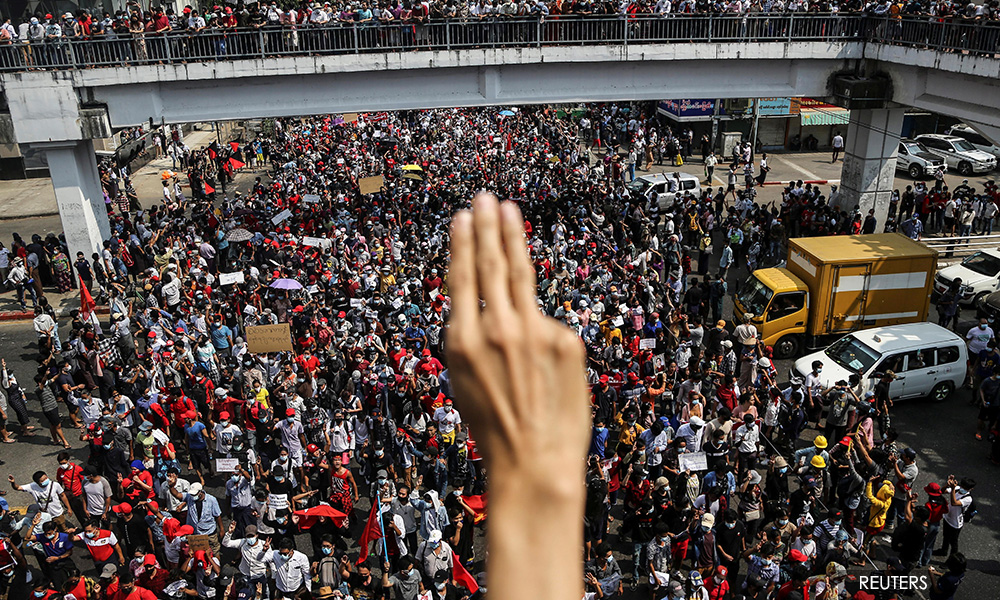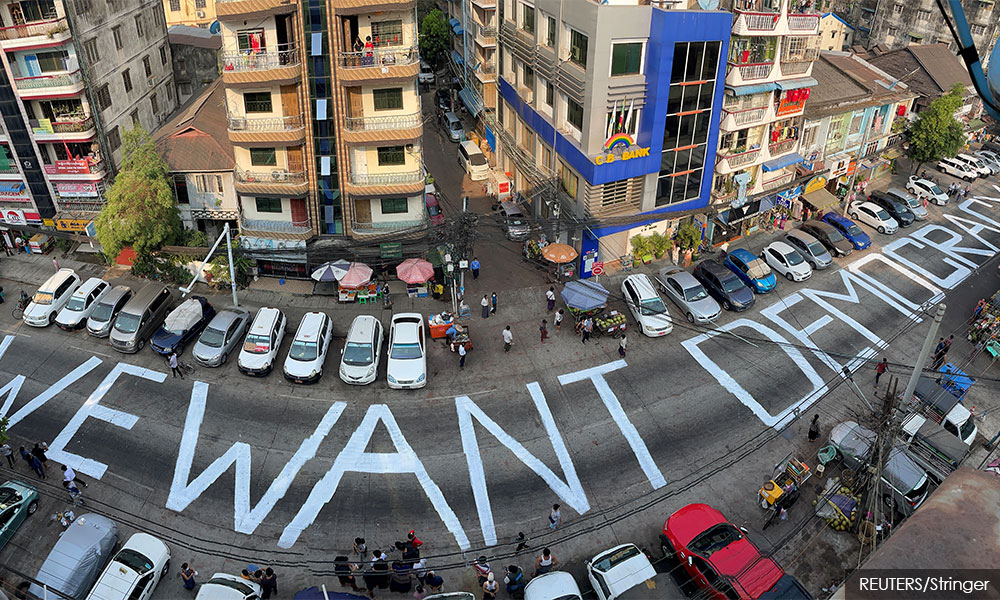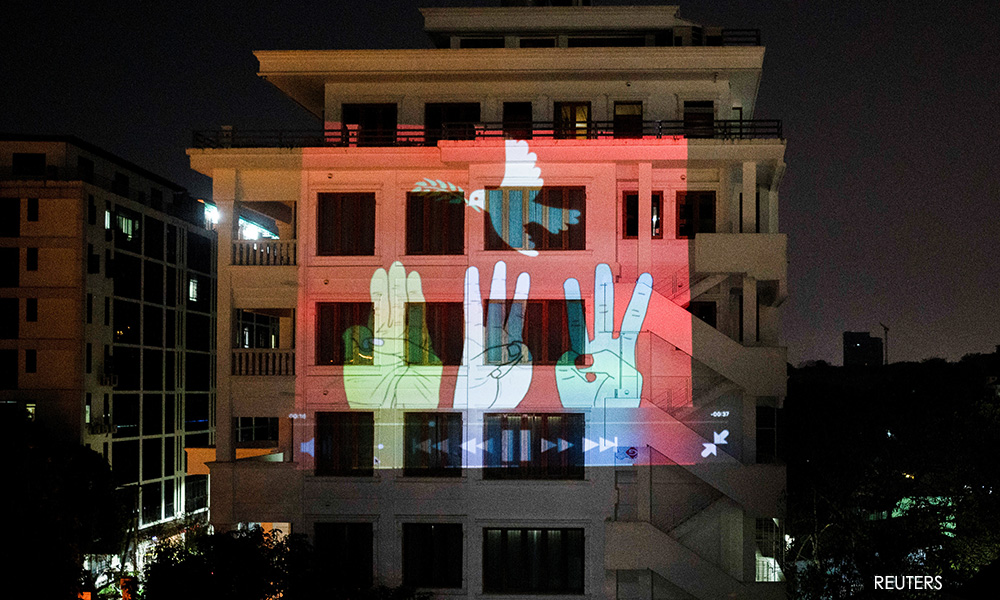On Feb 1, just 19 days after Putrajaya declared a “darurat”, Myanmar’s generals seized power with a military coup, which was legally justified also as an “Emergency”. Within days, there were mass street protests, not only in large cities such as Yangon and Mandalay, but also in many smaller towns. If Myanmar was Malaysia, this means there are demonstrations not only on the streets of Kuala Lumpur but also in smaller towns such as, say Segamat, Sitiawan, Sibu and Sandakan.
Creative, low-risk tactics have been used to power a massive, Mahatma Gandhi-style peaceful CDM (civil disobedience movement) against the military. Here are some examples:
1. Banging on pots and pans at 8pm every night. This creates lots of noise, and can be done within the safety of homes as it’s hard to pinpoint who is actually doing it in the dark! Creating clanging metal noises is also part of their traditional culture to drive away evil spirits from villages.
2. Using popular culture to protest - the three-finger salute from the movie ‘Hunger Games’ has been widely adopted in Myanmar, representing rebels fighting against tyrants. The gesture was first used after a military coup in Thailand in 2014 (where it was later banned).

3. Cars “breaking down” and driving slow - this is a classic civil disobedience tactic which blocks the movement of security forces and prevents civil servants from going to their offices. Some protesters also walk in circles around pedestrian crossings at busy junctions, urging people not to go to work.
4. Projecting artistic protest images (for example, of the three-finger salute) on city buildings at night. This literally creates “shining symbols” in Myanmar to restore democracy.
5. Protests against China, including at its embassy in Yangon. This targets the country perceived by people to be supporting the generals, even though its position is actually more ambivalent.
This probably makes China think twice about being too cosy with the military (which clearly lacks popular support) and to consider longer-term strategic interests.
5. Painting murals - from small, easy ones on buildings to huge letters on roads which can be seen from the air.

6. Creating “John Lennon walls” at bus stops and other public places - people put up small paper notes to express their anger against, or to make fun of, the military coup. Even though these (and murals) are regularly cleared by the authorities, they quickly resurface.
(You can read more about the creative protests at Irrawaddy.com, Myanmar’s main alternative news site)
Yellow balloons, evil clown
Despite the past history of brutality by the Myanmar military (people were shot and killed in previous uprisings in 1988 and 2007), on Monday the BBC reported that “hundreds of thousands” of people were on the streets while workers joined a general strike.
Mass civil disobedience using peaceful tactics was how Gandhi managed to “shake the foundations” of the almighty British Empire. For example, to protest London's monopoly on salt, Gandhi famously organised a mass march to the sea, asking the people to (illegally) make their own salt!

What about Malaysia?
Our Emergency is similar to that in Myanmar. As Anwar Ibrahim put it, it’s basically a “descent into dictatorship”. Ironically, after Muhyiddin Yasin was suspended as Umno deputy president in 2016, being a “dictator” is the exact thing that he then accused Najib Abdul Razak of.
Given this, it’s rather laughable that our Foreign Ministry said that Malaysia was “seriously concerned” about the military coup in Myanmar. Even worse, Putrajaya chose to send refugees back, possibly to face persecution, for there have been many groups there which have rebelled against the brutal military. Our government was even willing to ignore a High Court order to please the generals, raising questions if “backdoor business” was being done.
In contrast to the mass demonstrations in Myanmar, our dissent against Putrajaya’s Emergency was expressed mostly within the safety of our private WhatsApp groups, with not many daring even to venture onto Facebook to state our indignation, let alone get out onto the streets. Perhaps, this is because we are ethnically divided, though the Bersih 2 and 3 mass demonstrations were refreshingly multiracial.

Malaysians are rather more timid, and we protest by signing online petitions (that are easily ignored) or donating to the Malaysiakini Media Defence Fund. We also seem to lack creativity in our protests, though there have been some exceptions - Bilqis Hijjas dropped yellow balloons onto a function attended by Najib in 2015 and Fahmi Reza portrayed him as an evil clown in 2016.
‘Born again democrats’
Since Jan 12, what with Covid’s Many Confusing Orders (MCOs) and Chinese New Year, we’ve sort of half forgotten that there even is an Emergency. The joke is, the most outspoken people against it now are Umno politicians who have suddenly become “born again democrats”!
For example, the Dewan Rakyat deputy speaker slammed Muhyiddin’s government for suspending Parliament and refusing to use technology (hello, heard of Zoom?) to hold meetings (Even more extreme, Umno president Ahmad Zahid Hamidi said democracy in the country is now dead, like a person being “dikafankan” or wrapped in a Muslim burial shroud!
Of course, if somebody from Pakatan Harapan had said something similar, a thousand police reports would be lodged by weird NGOs (Newly Goreng Organisations), probably to accuse them of “insulting Islam”, as per the usual political “SOP”.
Actually, we don’t have to speculate. Back on Jan 12, all three Pakatan leaders - Anwar, Mohamad Sabu and Lim Guan Eng - issued a joint statement that Muhyiddin should not “hide behind” the Emergency when he had lost majority support in Parliament. But sadly, six weeks later, the authorities are going after only Lim for the joint statement, perhaps to make it look like “a Chinese questioning a Malay government” situation.
In the latest development, the Agong now says that Parliament can convene during the Emergency. Perhaps the repeated protests by Umno leaders - including Najib in his new-found role as Chief Troll against Perikatan Nasional - have been effective?
But we should not depend on Umno politicians to speak up for our rights, because they usually have a “prawn behind the stone” in their fake “perjuangan” (struggle), namely barely-disguised rewards to certain elites. Instead, we have to learn how to make our protests more visible using creative, low-risk tactics.
When it comes to peaceful civil disobedience against ‘Hunger Games’ tyrants and power-hungry politicians, Myanmar is definitely “lebih maju” or more advanced than us. Perhaps we can learn something from them.
ANDREW SIA is a veteran journalist who likes teh tarik khau kurang manis. You are welcome to give him ideas to brew at tehtarik@gmail.com. - Mkini
The views expressed here are those of the author/contributor and do not necessarily represent the views of MMKtT.



No comments:
Post a Comment
Note: Only a member of this blog may post a comment.